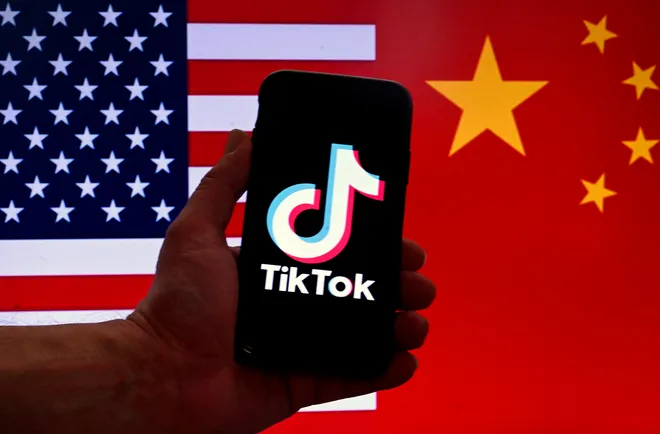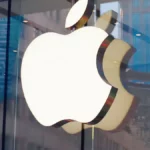In the escalating tech war between the United States and China, a new legislation aimed at banning or forcing the sale of TikTok’s U.S. operations has thrust the Chinese-owned app into the global spotlight. However, Beijing’s response has been remarkably muted, departing from its usual vociferous defense of Chinese tech giants embroiled in international disputes.
While Chinese officials have previously decried U.S. actions against TikTok as an attempt to suppress a Chinese company and a blatant display of American hypocrisy, their reactions to the new law have been notably restrained. When repeatedly questioned about the legislation this week, Beijing’s representatives have chosen to refrain from launching into their typical criticisms of Washington’s actions.
“Chinese officials have previously made clear China’s principled position on the U.S. Congress’s passage of the bill on TikTok, which you may refer to,” a spokesman for the Foreign Ministry stated on Wednesday, effectively sidestepping the opportunity to directly condemn the move. Similar evasive responses were offered the following day.
Remarkably, during Secretary of State Antony Blinken’s recent visit to China, the TikTok issue did not even surface in his conversations with Chinese officials
Remarkably, during Secretary of State Antony Blinken’s recent visit to China, the TikTok issue did not even surface in his conversations with Chinese officials, according to Blinken’s statement on Friday.
ByteDance, the China-based owner of TikTok, has reportedly stated its unwillingness to consider a sale of the app’s U.S. operations. Chinese officials at the country’s main internet regulator have privately indicated to the company their preference for TikTok to withdraw from the U.S. market if forced to do so, rather than opting for a sale, as reported by The Wall Street Journal.
Beijing’s relatively subdued response stands in stark contrast to its often forceful defense of another Chinese tech champion, Huawei Technologies, which has been embroiled in a prolonged feud with the U.S. over allegations of espionage and security concerns.
The calibrated public tone adopted by China in the TikTok saga may be a result of various considerations, including the timing of Blinken’s visit. ByteDance, which is more than half foreign-owned and counts prominent investors like Carlyle Group and General Atlantic among its shareholders, has sought to distance itself from Beijing as it has found itself in the crosshairs of U.S. scrutiny.
However, Beijing’s response also reflects the view that TikTok holds less strategic value for China than Huawei, according to people familiar with the matter. The video-sharing app is not seen as being as critical to China’s quest to become an industrial and technological powerhouse as Huawei, which has been at the forefront of the country’s ambitions in the telecommunications and 5G sectors.
While Beijing has refrained from publicly commenting on the new law in recent days, it has sought to leverage the issue to stir up domestic sentiment against the U.S. The Communist Party’s propaganda department, which regularly issues reporting guidelines to state-owned media outlets, has instructed such media to amplify their coverage of TikTok’s woes in the U.S. in favor of ByteDance, according to individuals familiar with the matter.
The legislation, signed by President Biden on Wednesday, marked a significant milestone in the years-long saga surrounding TikTok, in which China and the U.S. have engaged in a tug-of-war over who controls the popular short-video app and the vast trove of data generated by its 170 million American users.
The Huawei saga, in comparison, was seen by both governments as a higher-stakes contest and was fought with greater acrimony.
The Huawei saga, in comparison, was seen by both governments as a higher-stakes contest and was fought with greater acrimony. The arrest of Meng Wanzhou, Huawei’s then-chief financial officer, in Canada at the request of U.S. prosecutors in 2018, sparked a diplomatic crisis that lasted three years and involved negotiations at the highest levels between the two economic powers and Canada.
Several governments ultimately heeded U.S. calls to exclude Huawei’s equipment from their telecommunications networks due to security concerns, dealing a significant blow to the Chinese tech giant’s global ambitions.
While TikTok’s predicament may primarily be a matter of national pride, China is unlikely to relinquish the app without a fight. A forced divestment could be perceived as acquiescing to American bullying, and the app’s broad reach in the U.S. market makes it an asset that China may be unwilling to surrender easily. Last month, a Chinese Commerce Ministry spokesman warned that Beijing “will take all necessary measures to safeguard its legitimate interests.”
Victor Gao, vice president of the Center for China and Globalization, a Beijing-based think tank, expressed China’s view that the U.S. legislative maneuvers against TikTok constitute the seizure of a prized commercial asset, violating American values such as free speech and private property rights.
“The Americans have been telling the Chinese that the most important thing is intellectual property,” Gao said. “And this is how they trample on the intellectual property of another company.”
Chinese officials are frustrated by the U.S.’s decision to force a ban on TikTok without presenting concrete evidence, said Xiaomeng Lu, a director at consulting firm Eurasia Group. From Beijing’s perspective, “now Washington is setting a precedent for excessive government control over technology platforms,” she added.
TikTok has vowed to challenge the legislation in court, with Chief Executive Shou Zi Chew asserting, “Rest assured, we aren’t going anywhere. The facts and the Constitution are on our side, and we expect to prevail again.”
On Chinese social media, reactions to the TikTok legislation have ranged from bemusement to anger, with many internet users mocking the U.S. for its perceived hypocrisy and attempts to undermine successful Chinese firms. One user on Weibo, a Chinese platform similar to Twitter, suggested that the TikTok debate was merely political theater, noting that “the bill requires ByteDance to divest TikTok within 270 days. America’s new president will be sworn into office in 271 days.”
However, analysts suggest that the TikTok incident is unlikely to significantly alter the broader geopolitical tensions between the two powers. Ja-Ian Chong, a Singapore-based scholar at Carnegie China, noted that the movement of the TikTok bill has been very public, and discussions of such measures have taken place over several months.
“There is a lot of breathlessness over TikTok, but the U.S. and PRC [the People’s Republic of China] have a great number of differences between them that are probably more serious, including over Russia, Taiwan, the South China Sea,” said Chong.
As the TikTok saga unfolds, it represents a complex interplay of economic interests, national security concerns, and geopolitical maneuvering. Beijing’s strategic silence may be a calculated move to avoid escalating tensions further, while quietly signaling its preference for withdrawal over a forced sale. However, the broader tech war between the two superpowers is far from over, with TikTok serving as the latest battleground in a conflict that transcends any single app or company.



